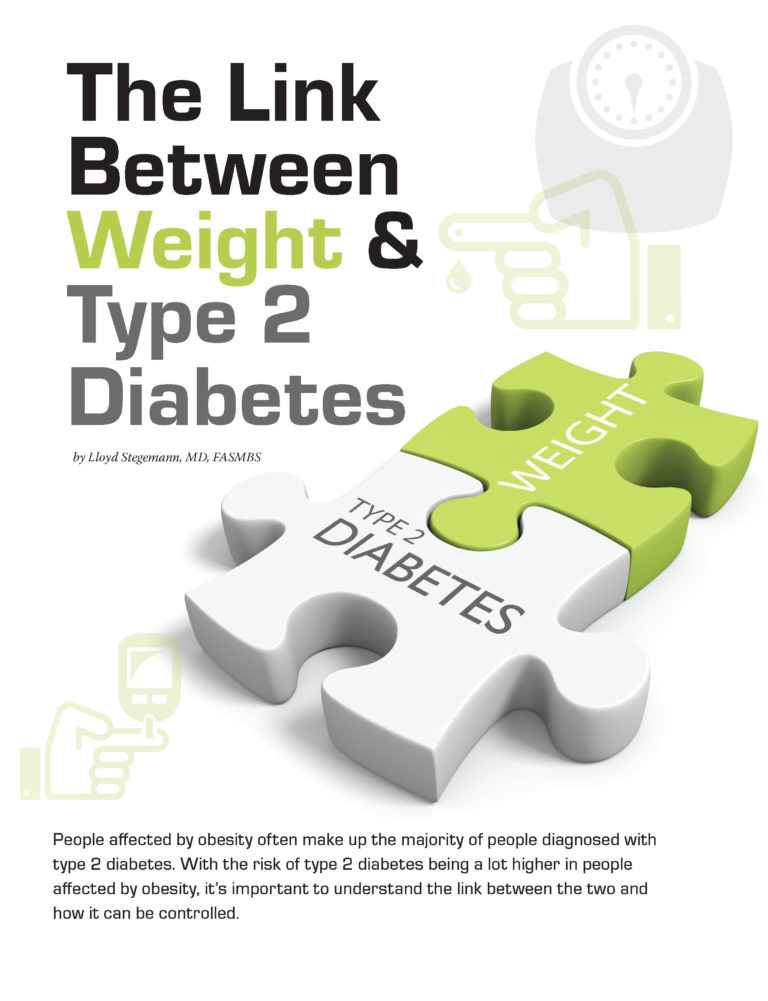The Link Between Weight & Type 2 Diabetes


by Lloyd Stegemann, MD, FASMBS
Summer 2021
People affected by obesity often make up the majority of people diagnosed with type 2 diabetes. With the risk of type 2 diabetes being a lot higher in people affected by obesity, it’s important to understand the link between the two and how it can be controlled.
Understanding Glucose
To start this conversation about weight and type 2 diabetes, we need to understand a few basic facts about how our body regulates sugar (glucose) and what happens when that regulation doesn’t work.
When we eat, the food is broken down by our stomach acid into protein, fats, sugar and fiber. All of this is released out of the stomach and into the small intestine where protein, fat, and sugar absorption occurs. As the food is absorbed, it goes into our blood. The pancreas then senses the rising blood sugar and releases insulin, which opens the door that allows sugar to go into the cells to provide energy.
What is Diabetes and How Does Weight Affect it?
There are two types of diabetes: type 1 and type 2.
Type 1 diabetes (previously called juvenile diabetes) occurs when an individual’s pancreas does not have the ability to make a normal amount of insulin.
In type 2 diabetes (previously called adult diabetes), the pancreas makes plenty of insulin, but the insulin is not being recognized by the cells for reasons that are not fully understood at this point. This is called insulin resistance. Because the cells don’t recognize the insulin, they won’t let the sugar in, so the amount of sugar in the blood remains high. The high level of sugar in the blood ultimately starts to damage blood vessels and lead to diabetes complications such as:
- Heart attacks
- Strokes
- Blindness
- Amputations
- Kidney failure
The biggest risk factor for type 2 diabetes is weight. In fact, obesity (BMI > 30) increases the risk of developing type 2 diabetes by 85%. With rising obesity rates in the U.S., there are more than 34 million people who have type 2 diabetes and another 88 million people who have prediabetes.
Weight-loss is critical to the proper management of diabetes because it is the excess fat, especially the fat around our intestines known as visceral fat, that causes diabetes in the first place. Weight-loss of just 5-10% of body weight can dramatically improve your diabetes, reduce your need for medications, and in some individuals, reverses diabetes altogether. As we all know, losing weight and keeping it off can be exceedingly difficult.
Ways to Lose Weight and Control Your Diabetes
See Your Doctor or an Obesity Medicine Specialist
The first step in controlling your diabetes is to see a doctor or obesity medicine specialist who can advise you with a treatment plan and prescribe medication. Your doctor or obesity medicine specialist will know what is right for you in terms of weight-loss, controlling your blood sugar and losing weight.
Get Rid of Any Sugary Beverages
This is a simple step that will immediately drop the number of calories you are taking in daily and make it easier to control your blood sugar. Fill your fridge with healthier options like water, flavored water, diet sweet tea or green tea, Gatorade Zero, Powerade Zero, diet Snapple, etc.
Reduce Carbohydrates
Your body breaks down carbohydrates into sugar, so the lower you keep your carbohydrate intake, the easier it is to control your blood sugar. It also helps if the carbohydrate is more complex (think brown carb vs. white carb) because it will be more difficult for the body to break down the carbohydrate, so the sugar is released more slowly.
The current recommendation if you have diabetes is that no more than 45% of your daily calories should come from carbohydrates. That breaks down to basically a maximum of 45-60 grams of carbohydrates per meal and 15-20 grams per snack. I recommend that you buy snacks which are low in carbohydrates, or grab a protein or a vegetable.
Consider Seeing a Dietitian
Seeing a dietitian can be very helpful in getting on a healthier eating plan that reduces your daily calories but doesn’t make you feel like you are on a diet. Dietitians can also help you create meal plans with an appropriate amount of carbohydrates and help you get through the inevitable plateaus that happen when we lose weight.
Begin an Exercise Program
Regular exercise helps with weight control and reduces the insulin resistance that is the root cause of diabetes. People with diabetes who regularly exercise are less likely to have complications such as heart attacks, strokes and nerve problems. There is also no question that regular exercise is key to keeping weight off once you lose it.
Practice Active Stress Reduction Techniques
Poorly managed chronic stress leads to the accumulation of abdominal (visceral) fat, which is the type of fat that is associated with diabetes. Simply taking a few five-minute breaks during the day to “de-stress” will encourage your body to let go of abdominal fat. Practicing good stress management can also help you sleep better. There are dozens of stress reduction techniques and you just need to find which one you respond to best and then do it!
Be Patient
You didn’t gain all your weight in a week and you won’t lose it all in a week either. Work to achieve consistency, not perfection. There are going to be some weeks where you do everything right and you won’t lose a pound, which can be incredibly frustrating. Just know that you will continue to lose weight if you keep working at it. Find joy in seeing the progress you make with how you feel, your dependency on medications, and your ability to do the things that you enjoy.
Take Control
Being diagnosed with type 2 diabetes is often the push that an individual needs to start addressing their weight. Keep in mind that it does not take huge amounts of weight-loss to dramatically reduce your need for diabetic medications or to see the diabetes go away altogether. Taking control of your weight is key to managing your type 2 diabetes, so do it in whatever way works for you.
About the Author:
Lloyd Stegemann, MD, FASMBS, is a bariatric surgeon in Corpus Christi, TX, and an Obesity Action Coalition (OAC) National Board of Directors member. He is also Co-Chair of OAC’s Access to Care Committee and is a passionate advocate for universal access to bariatric surgery.
by Kendall Griffey, OAC Communications Manager Spring 2024 We have officially kicked off Your Weight Matters Regional…
Read Articleby Sarah Ro, MD; and Young Whang, MD, PhD Fall 2023 Mary, a postmenopausal woman with a…
Read Articleby Rachel Engelhart, RD; Kelly Donahue, PhD; and Renu Mansukhani, MD Summer 2023 Welcome to the first…
Read Article








